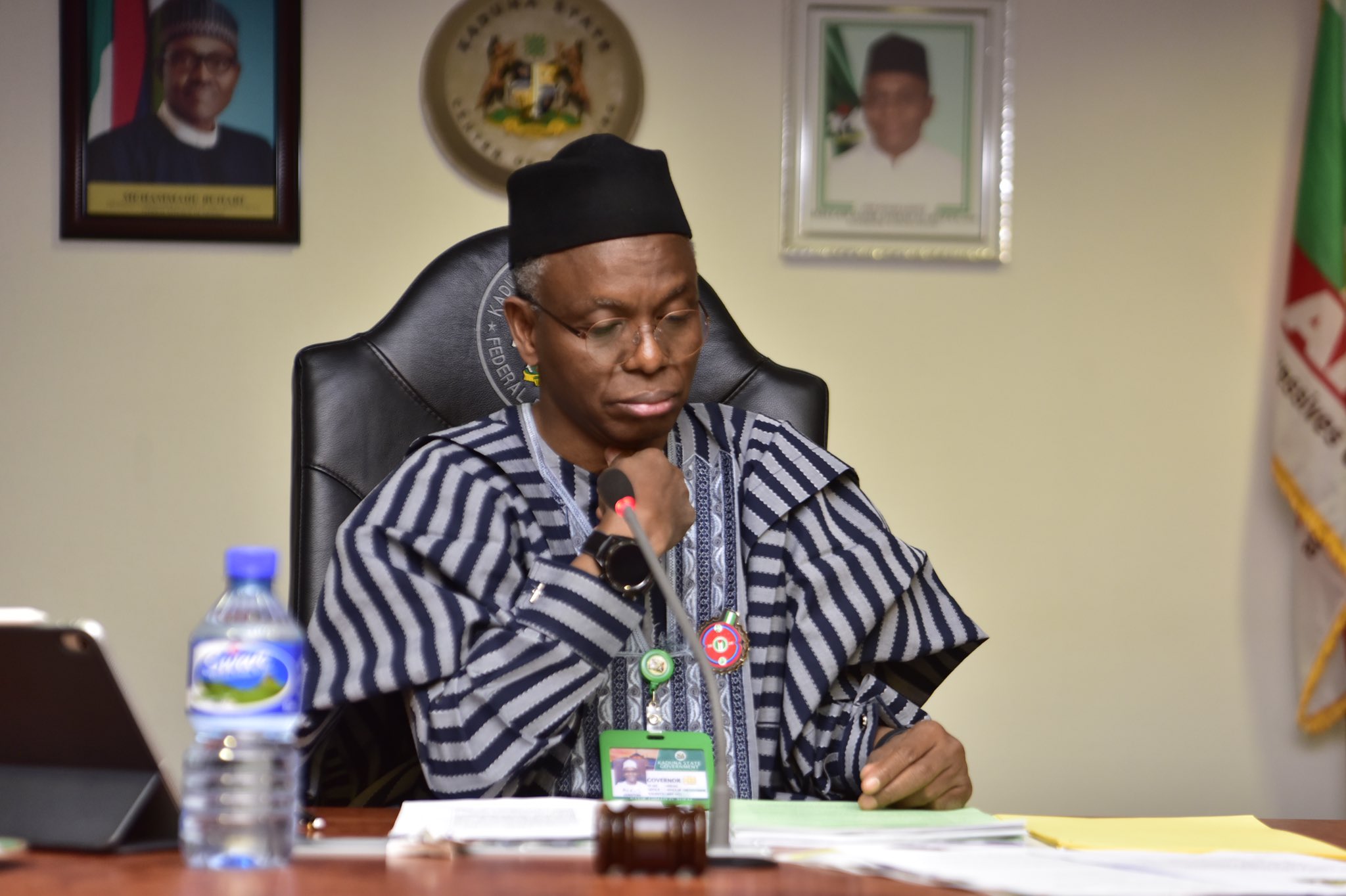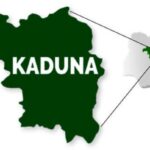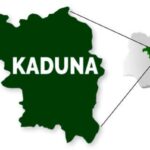Governor Nasir El-Rufai of Kaduna State is not a stranger to controversies. Since he assumed office in 2015, Kaduna State has been in the eye of the storm due to his stance on political and economic issues, which has constantly pit him against stakeholders.
From his entrance into the political limelight during the regime of former Head of State, General Abdusalami Abubakar (retd), to his times as the director-general of the Bureau of Public Enterprise (BPE) and as Minister of the Federal Capital Territory (FCT) under the Olusegun Obasanjo, and now as the governor of Kaduna State; it has been from one controversy to another.
He pursues his goals ferociously, regardless of whose ox is gored. He has endured several threats and intimidations to remain relevant in Nigeria’s political scene.
From demolition of buildings to the mass sack of workers in Kaduna, as well as a Muslim-Muslim ticket during the last elections and an unpopular security measure, the governor has continued to attract both fans and critics. While his fans see him as a reformer and brilliant politician who is not afraid to make tough decisions, his critics say he is arrogant, impulsive and a ‘tyrant.’
In his most recent faceoff with the Nigeria Labour Congress (NLC), which grounded economic activities in the state for three days, El-Rufai made controversial comments, including declaring the NLC president, Ayuba Wabba, wanted. He went ahead to sack all the nurses in the state and threatened university lecturers with a sack as well. He didn’t mince words when he called out his colleagues for not supporting him during the faceoff with the labour union but admitted that he was used to fighting battles alone.
Asked to describe the governor, his special adviser on media and communication, Muyiwa Adekeye, said his principal was a very clearheaded man. “He speaks frankly about problems and solutions,” he said.
During El-Rufai’s tenure as the director-general of the BPE, he stoked controversy on the privatisation of some government agencies, including the Pentascope, which led to his disagreement with former Vice President Atiku Abubakar, who was the chairman of the National Council of Privatisation.
A major controversy was during El-Rufai’s transition from BPE DG to a minister, at the outset of the second term of the Obasanjo administration when he accused members of the National Assembly of demanding bribe to smoothen his clearance as minister.
Through his actions as the FCT minister, El-Rufai was pitted against many bigwigs as he demolished many slums and other settlements without blinking an eye. In fact, during the period, his name was synonymous with demolition, which became the order of the day.
The Housing and Land Rights Network (HLRN), in a letter to former President Obasanjo and international organisations, stated that 800,000 people were rendered homeless by the “brutal eviction and demolition of Abuja communities,’’ during El-Rufai’s tenure as minister.
Prominent among the affected communities, according to the HLRN, were Wuse (2004), Mpape (2004), Dantata (November 2004), Old Karimo (November 2004), Jabi/Kado (April 2004), Chika (November 2005), Idu Karimo (2005-2006), Kubwa (June 2005 – April 2006) and Dei-Dei (April 2006).
He always finds a way of passing his messages across, even without occupying elected or appointed positions. His exposés in his memoir, The Accidental Public Servant, generated a lot of uproars as it revealed his altercation with former Vice President Atiku Abubakar, Late President Umaru Musa Yar’adua and other top shots in the country.
Because of his antecedents, residents of Kaduna anticipated that buildings would be demolished when he was voted in as governor in 2015. The fear continued in 2019 as he was reelected.
Nicknamed Mai Rusau, El-Rufai did not waste time in rolling out a blueprint for a master plan for infrastructure in the state. For him, accelerated development of infrastructure is vital to his administration’s vision to make Kaduna great.
He began with the demolition of structures allegedly built on government-owned lands. This attracted a lot of uproar from those who were directly affected.
He was caught in another controversy when the Kaduna State Urban Planning and Development Agency (KAPSUDA) led a demolition exercise to homes of his political opponents like the late Inuwa Abdulkadir, a lawyer and stalwart of the All Progressives Congress (APC), along Yakubu Avenue, and a former senator representing Kaduna North, Suleiman Hunkuyi, located at 11b Sambo Road. This was later converted to a children’s park.
When these politicians accused the governor of intimidation aimed at forcing them to submission, the KASUPDA said they simply carried out their duty to demolish structures considered illegal.
Also, the governor believes that to achieve his massive infrastructural plan for the state, old and dilapidated market structures, as well as buildings in strategic locations, would give way for the improved and modern road network and malls.
To this end, popular markets like Kasuwar Barchi, Tudun Wada, Kawo, Kasuwar Magani, among others, were demolished. This action generated a lot of controversies from traders and shop owners alike. But their opposition did not stop Governor El-Rufai’s bulldozers from crushing the structures, which he is now replacing with modern facilities.
Speaking on the governor’s actions, his special adviser on media and communication, Muyiwa Adekeye said, “We need to be pragmatic and logical about the way houses are built. We need to follow regulations because public health matters. It is not just about the aesthetics of a city but even about the safety of the people who live in those areas and the possibility that they can enjoy access to public utilities.”
Another of his earliest policies that generated controversy was in 2016 when he revived the religious preaching bill and sent it to the Kaduna State House of Assembly for consideration. The bill was aimed at substituting the state’s religious preaching edict, 1984, promulgated under the military regime to address religious violence in the state but was not implemented. However, due to uproar from Muslim and Christian groups, the bill suffered a setback.
The governor received knocks from a lot of Nigerians, who accused him of violating citizens’ fundamental human rights as enshrined in the constitution. The bill was, however, eventually passed by the House of Assembly as “Kaduna State Religious Preaching (Regulation) Law, 2019.”
Again, in 2019, El-Rufai became the first governor of Kaduna State to win the election under a Muslim-Muslim ticket. He dared the people and succeeded in changing an age-long political order in which Kaduna North and Central, dominated by Muslims, had produced the governor, while Kaduna South, dominated by Christians, produced the deputy.
During his first tenure, Bala Bantex, an architect and Christian from Kaduna South, was the deputy governor, but he later opted to represent his people in the Senate, thereby creating a vacuum and the governor had to shop for a replacement. Being that the southern senatorial zone, a stronghold of the major opposition, the Peoples Democratic Party (PDP), had turned their back to El-Rufai at that time, he opted for Dr Hadiza Balarabe, a Muslim from Sanga in the same senatorial district.
The governor’s decision was greeted with condemnations as many said it would further fragment the state and promote disunity among Christians and Muslims. But he was not bothered, insisting that he was not after religion but competence. And he went ahead to win the election.
He described the Muslim-Muslim ticket as his most daring decision but said it was necessary to take religion and ethnicity off the table in the politics of Kaduna State.
Furthermore, when some of his colleagues in the North-West were desperate to negotiate with bandits to put a stop to constant killings and abductions in their states, El-Rufai was the first governor to make it clear that he would not negotiate with the criminals. He suggested that all bandits should be killed. The governor said he would not pay ransom to bandits even if they abducted his son or any member of his family.
Because he made this pronouncement when 37 students of the Federal College of Forestry Mechanisation, Afaka, were in the captivity of bandits, the governor received a backlash. He was also not deterred when bandits abducted and killed five of the 23 students abducted from the Greenfield University, Kaduna in an attempt to blackmail him. He received further knocks when he insinuated that he was prepared to lose some of the students of Afaka if it meant all the bandits would be killed during a rescue operation.
The recent sack of about 4,000 workers by Governor El-Rufai, which led an industrial action by the Nigeria Labour Congress (NLC) for three days, was his most recent controversy.
Before his recent confrontation with the organised Labour, El-Rufai had a faceoff with the union when, in 2017, he sacked about 21,000 teachers for failing primary four tests. He also sacked workers from various ministries and departments, as well as some traditional rulers, as part of his attempt at reforming and restructuring traditional institutions in the state to reduce the burden of bloated payrolls on local government councils.
Although the state government had replaced the sacked teachers with 25,000 others, the governor has continued to suffer attacks on his past action.
Defending their action, the state government, through the governor’s special adviser on media and communication, said there was nothing controversial about trying to ensure that public resources are spent on people who actually merit it, rather than those who simply have access to media platforms to echo their frustrations.
“Even before he won the election, the governor had said the public sector could directly employ only a very tiny fraction of the residents of a state. So, public policy must try to encourage the private sector for job creation,” he said.
He’s undemocratic governor – Kaduna PDP
For the Peoples Democratic Party (PDP) in Kaduna State, El-Rufai’s policies portray him as undemocratic.
Abraham Albera Catoh, the Publicity Secretary for the PDP in Kaduna State said El-Rufai’s policies in demolishing houses and shops, specifically without recourse to the rule of law and mass sack of civil servants as well as increment in tuition fees for the state university students was against everything the PDP stands for.
According to Catoh, El-Rufai’s anti-people policies have not only created unemployment but worsened the security situation in the state. “Kaduna State is doing very badly on issues that relate to human existence due to the activities of the governor. The PDP as a party is very democratic, we never come up with such policies without getting feedback from the people,” he said.
“The governor is not democratic, we believe as a party in a democratic country, there should be some kind of public hearing before any policy is implemented. Even if you are going to implement the so-called urban renewal policy, you are supposed to hear from the residents,” he said.
He however said the PDP was not against urban renewal especially when it started it under the Namadi-Yakowa administration.
From Lami Sadiq, Maryam Ahmadu-Suka, Mohammed I. Yaba (Kaduna) & Taiwo Adeniyi (Abuja)

 Join Daily Trust WhatsApp Community For Quick Access To News and Happenings Around You.
Join Daily Trust WhatsApp Community For Quick Access To News and Happenings Around You.


